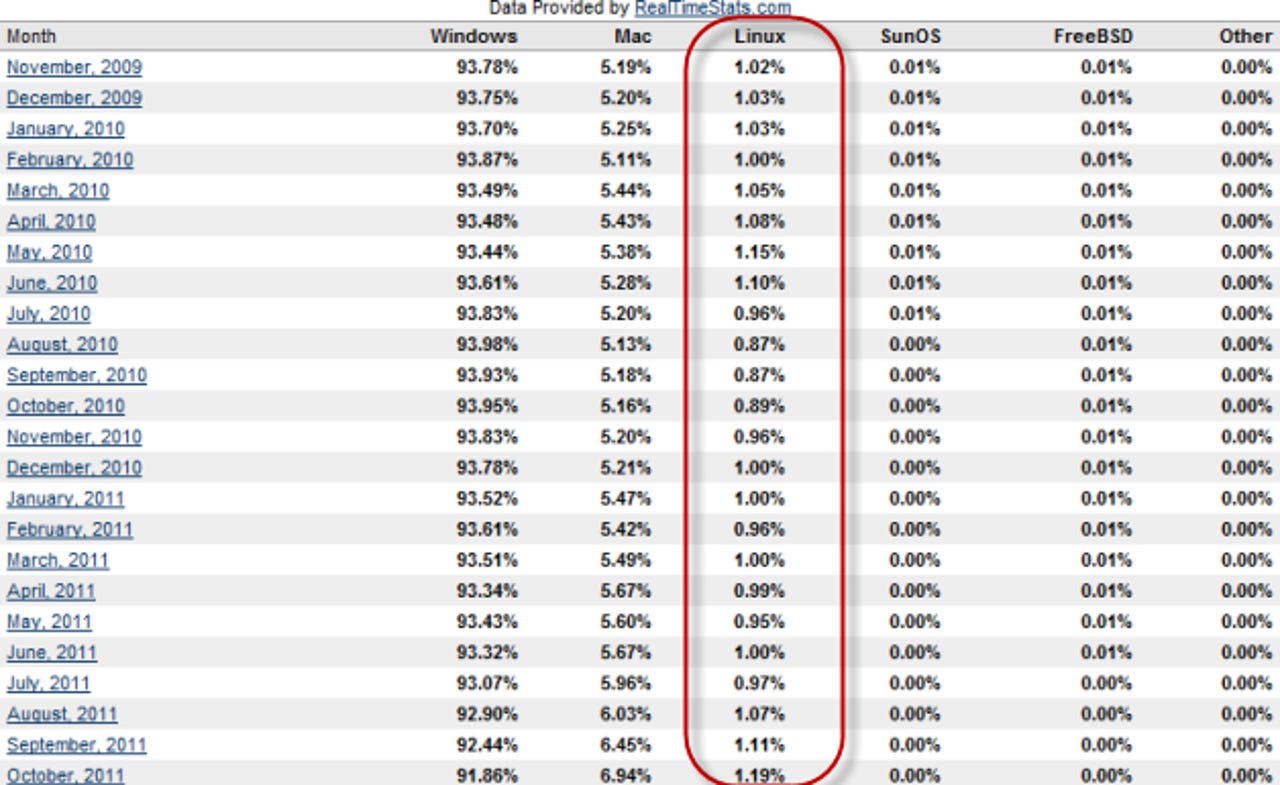The 'Year of the Linux desktop' isn't coming

Linux is 20 years old this year, and for most of those years I've been hearing about how the 'Year of the Linux desktop' is coming. It's not coming. Linux it's stuck permanently at a 1% market share. And that's where it'll be ten years from now.
But that doesn't mean that there's no hope for the OS.
Let's take a look at some data.
Exhibit A - NetmarketShare data, Nov 2009 - Oct 2011:
Exhibit B - StatCounter data, Nov 2009 - Oct 2011:
Data from both NetmarketShare and StatCounter shows that Linux usage share (that is, browser traffic to selected websites from Linux systems) as a total flatline for the entire period covered by both metrics firms.
Around 1%.
Now, I'm no anti-Linux zealot. I like Linux. I like it a lot. I happen to think that it serves a valuable purpose in offering the world a free operating system that people can do with as they please. I also think that Ubuntu is well beyond the point where it's certainly easy enough for anyone who can install Windows to install it onto a PC. As long as there aren't any hardware issues (which are more likely on portable systems than desktops), then it's as easy, if not easier, to manage as Windows. Many consumers, in particular those who do most of their computing through the browser, would be more than happy with Linux ... if they knew about it.
And that's the problem. Sure, Linux is on servers and supercomputers. It's also used by the film industry to bring us movies like 'Cars' and 'Titanic.' Linux also lives in many smartphones and tablets, TiVo devices, routers, in-car GPS receivers and much, much more. A huge number of people make use of Linux each and every day and don't even know it.
The desktop/portable operating systems race is a one-horse race - Windows - and it seems set to stay that way for the foreseeable future. Even Apple, which has enjoyed enormous success over the past few years (especially since transitioning to Intel CPUs) can only manage a very distant second place with the Mac OS. When you consider that Apple, with all the resources the company has at its disposal, can only manage usage share measured in single percentage points, it's pretty amazing really that Linux is only a few percentage points behind.
Microsoft dominates, and the only possible threat to them comes from Apple, not Linux. So let's give up on the whole 'Year of desktop Linux' thing. I predict (and I'd place a wager on this) that Linux usage share won't be far from where it is today five years from now. I honestly don't think that even ten years from now things won't have changed much.
Around 1%.
But that doesn't mean we have to give up on Linux. Oh no. While the desktop market is far too stitched up (OEMs pushing Windows, Apple pushing Mac OS), Linux is still very important. Not just servers and supercomputers, but in the mobile space.
Exhibit C - StatCounter data, Nov 2009 - Oct 2011:
Android, which has a kernel based on the Linux kernel, is doing well. It is rapidly catching up with Apple's iOS, and with Symbian in decline now that Nokia has moved to Windows Phone, has a chance to be a really big player. I fully expect Android to become the dominant mobile OS in the next year or so.
People won't know (or for that matter care) that they're using Linux, but that doesn't matter. I happen to think that Ubuntu could be a big player on smartphones and tablets. I also think that Unity is just what's needed to make Linux less Linux-y for the average user (though folks such as my esteemed colleague Jason Perlow dislikes Unity with the heat of a thousand suns) and that these improvements might give it traction in the mobile market.
The 'Year of mobile Linux' IS coming!
Related:
